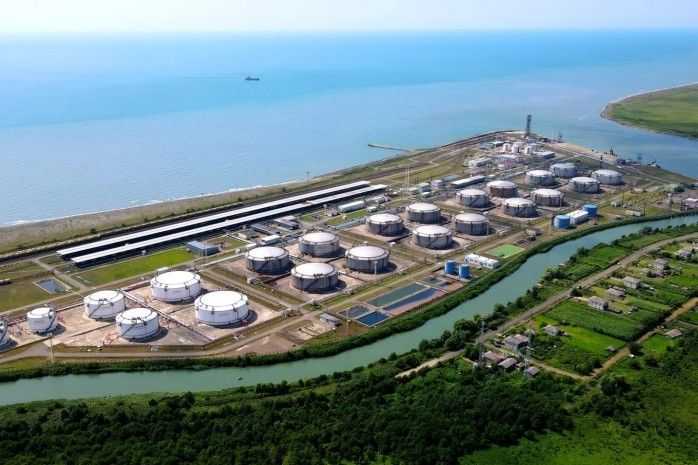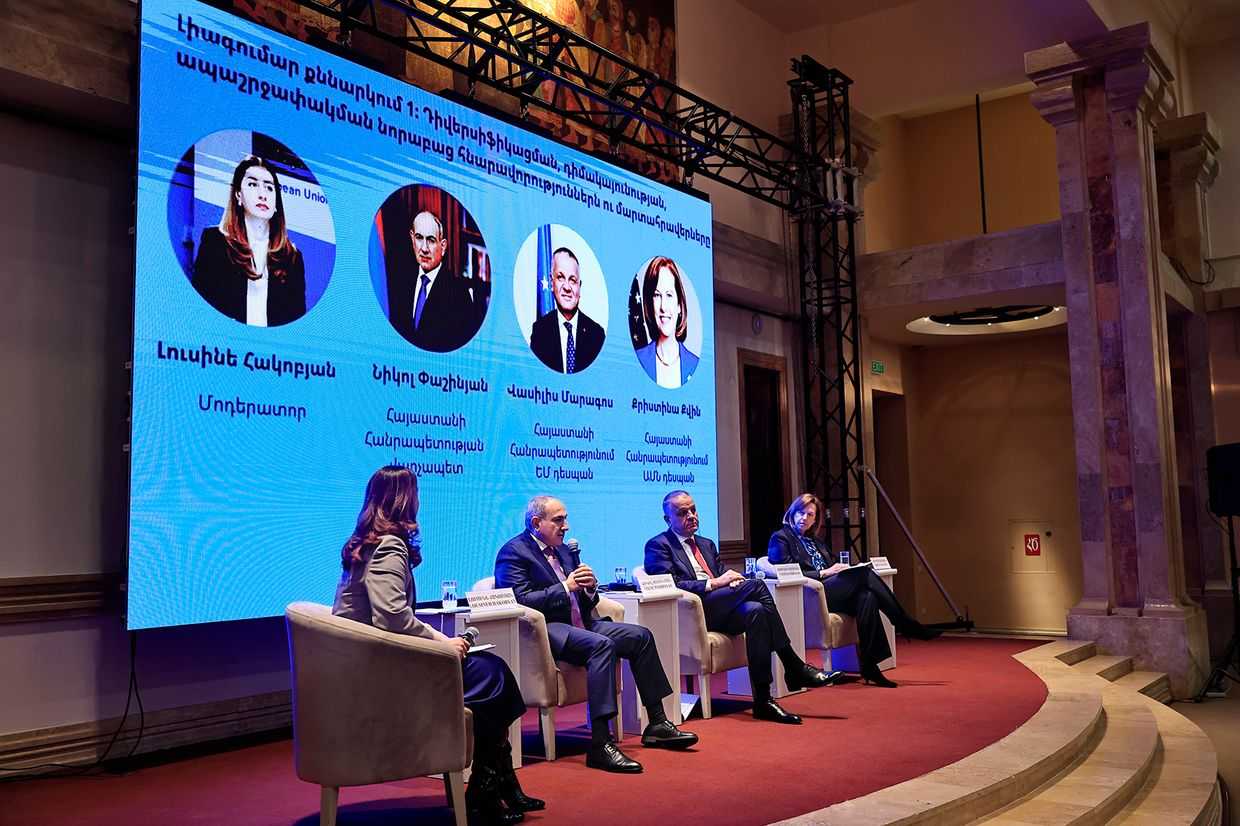
Georgian Prime Minister Irakli Kobakhidze has announced the country is halting its EU membership bid ‘until the end of 2028’.
In a press briefing on Thursday, Kobakhidze said the issue of opening accession negotiations with the EU would not be ‘on the agenda’ during the current parliament.’
He added that the government would also be refusing any budgetary support from the EU. The EU previously announced they were halting funding to the Georgian Government over the foreign agent law and other anti-democratic moves by Georgian Dream.
Kobakhidze claimed that Georgia would be ‘economically prepared’ to begin negotiations with the EU only by the end of 2028, aiming for membership by 2030. After the EU declined to open negotiations with the country in 2023, party officials had insisted that Georgia deserved to begin negotiations.
Opening accession negotiations would be the next step for Georgia’s stalled membership bid. The bloc opened negotiations with both Ukraine and Moldova, the two other countries from the ‘association trio’, in December 2023, while declining to do so for Georgia citing democratic backsliding.
Kobakhidze’s triggered spontaneous protests outside the parliament building and Georgian Dream’s offices in Tbilisi, at Europe Square in Batumi, as well as in Kutaisi and municipal administration in Zugdidi. The protest in Kutaisi reportedly resulted in arrest of Mishiko Mumladze, the organiser of the rally.
Opposition groups were quick to denounce the announcement as a betrayal of the Georgian people.
In a late night address, President Salome Zourabichvili appealed to public servants, including the police, to follow their conscience.
‘We intend to join the European Union not through begging or standing on one leg’
While announcing a pause in the membership process, Kobakhidze claimed that the government would continue ‘fulfilling the obligations outlined in the Association Agenda and the [Deep and Comprehensive] Free Trade [Area] agreement’, pledging to meet ‘over 90%’ of them by 2028.
The previous EU enlargement report released by the European Commission in October stated that Georgia had regressed in several key areas, including fundamental rights and freedoms.
‘We intend to join the European Union not through begging or standing on one leg, but with dignity, by establishing a well-functioning democratic system and a strong economy.’
Since March last year, the ruling party and its affiliated media have frequently used the metaphor of ‘hopping on one leg’ to portray their domestic critics as compliant Georgians following the directives of ‘outside powers’, aligning with the spirit behind the foreign agents law they passed this year.
The news came following a scathing resolution adopted by the EU Parliament earlier on Thursday, which rejected the legitimacy of 26 October’s parliamentary elections in Georgia, calling for a new vote by independent electoral authorities. The resolution also called for sanctions on senior Georgian Dream officials, including Kobakhidze, party secretary Kakha Kaladze, parliamentary speaker Shalva Papuashvili, and Georgian Dream’s founder, Bidzina Ivanishvili.
Responding to the resolution, Kobakhidze described the EU’s expectations and criticism of Georgia’s leadership during the membership process as a form of ‘blackmail’ and a tool to ‘sow divisions’ among Georgians, asserting that it was ‘absolutely offensive to Georgian society’.
‘We must clearly show European politicians and bureaucrats, who are completely devoid of European values, that they should speak to Georgia not with blackmail and insults, but with dignity.’
‘The ill-wishers of our country have turned the European Parliament into a bare weapon of blackmail against Georgia, which is a great disgrace for the European Union.’
Public opinion polls have consistently shown overwhelming support for the country joining the EU. A poll released in late 2023 commissioned by NDI showed 86% of respondents stating they were in favour of membership.
The move to freeze the accession process also potentially puts the government in breach of the constitution.
Constitutional changes introduced by Georgian Dream in 2017 state that ‘all measures within the scope of their competences to ensure the full integration of Georgia into the European Union and the North Atlantic Treaty Organisation’
In his speech, Kobakhidze claimed that the issue of opening an association agreement with Georgia had replaced EU membership candidacy as a tool to ‘divide’ Georgians and foster ‘radicalisation’ in the country’s domestic politics. This echoed a similar allegation he made in June 2022, three months after the Georgian Dream government applied for EU membership, when he suggested that the candidacy might have been part of a plot to bring about the government’s downfall and involve Georgia in war with Russia.
Kobakhidze argued that the timing of accession negotiations were not significant as a year and a half or two years would be enough to complete this stage, and cited Montenegro and Serbia, which began their accession talks as early as 2012 and 2014, respectively and have yet to join the bloc.
‘This has not accelerated their European integration in the slightest,’ Kobakhidze insisted, skipping any reference to the institutional reforms required from Montenegro and Serbia by the EU’s accession conditionality.
Kobakhidze did refer to reforms in Georgia, but only to claim that the Georgian Dream government’s lack of progress on EU accession talks was unrelated to them.
‘Georgia is being asked not for reforms but for steps that amount to renouncing its dignity’, he insisted, citing the EU’s demands to revoke the foreign agent law and the law ‘against LGBT propaganda’ among others.
Opposition reacts with anger
All four major opposition groups instantly condemned the announcement on Thursday night.
Elene Khoshtaria from the Coalition for Change, accused Georgian Dream of halting ‘the will of the Georgian people […] enshrined in the Constitution’.
Unity — National Movement leader Tina Bokuchava characterised it as an attempt by the ruling party to evade EU scrutiny of the October elections. ‘What do we do? Either we fight or we surrender to Russia — the choice is ours’, Bokuchava wrote on Facebook.
Mamuka Khazaradze, the leader of the opposition Strong Georgia group, echoed a similar sentiment, announcing a ‘new national liberation movement’ over the issue.
‘Let us defend our freedom and our future!’, Khazaradze wrote.
Giorgi Gakharia, chair of the For Georgia party and former ally of Bidzina Ivanishvili, held Ivanishvili personally responsible for this decision, describing it as a ‘grave’ and ‘treacherous’ step.
The leaders of Coalition for Change, Unity – National Movement, and Strong Georgia promptly met with President Zourabichvili at the Orbeliani Palace following her seemingly spontaneous meetings with several foreign ambassadors there.
In a late night address, she called Kobakhidze’s announcement a ‘constitutional coup’ that had been brewing for ‘weeks or months’.
‘Today […] this illegitimate government declared not peace, but war — against its own people, its own past, and its own future.’
Zourabichvili called for opposition unity, adding that ‘in the face of this challenge, we are either united, or we will cease to be.’
She urged public employees to ‘start thinking about the future you’re leaving for your children’.
She appealed to Georgian diplomats to ‘help us in the only demand of our people, of our whole society — announcing and holding new elections’.
She urged the ‘real police who serve the state’ to protect citizens, ‘instead of defending slaves, Russians, foreigners, or traitors’.
‘So take into your own hands what must be decided by you’, she said.
Zourabichvili also appealed to the army with a similar message, but clarified that they ‘cannot engage in any activity nor is it mandated to’.









